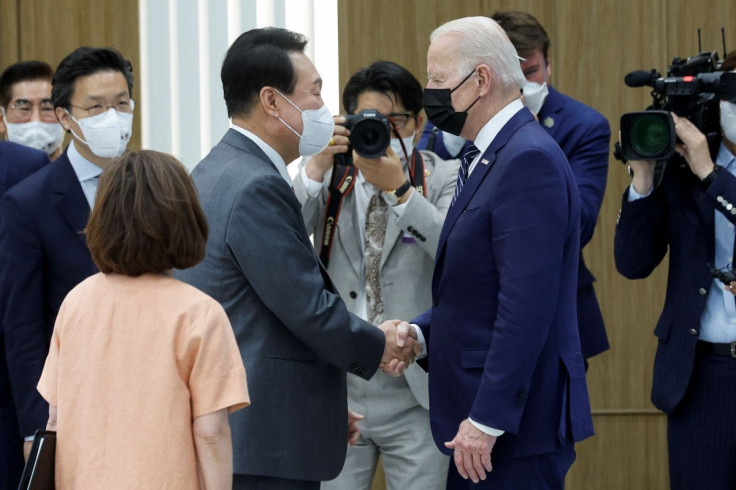Biden, S.Korea's Yoon Vow To Deter N.Korea While Offering COVID-19 Aid

President Joe Biden and his new South Korean counterpart agreed on Saturday to hold bigger military drills and deploy more U.S. weapons if necessary to deter North Korea, while offering to send COVID-19 vaccines and potentially meet Kim Jong Un.
Biden and Yoon Suk-yeol said their countries' decades-old alliance needed to develop not only to face North Korean threats but to keep the Indo-Pacific region "free and open" and protect global supply chains.
The two leaders are meeting in Seoul for their first diplomatic engagement since the South Korean president's inauguration 11 days ago. The encounter between allies was clouded by intelligence showing North Korean leader Kim Jong Un is prepared to conduct nuclear or missile tests.
Yoon had sought more assurances that the United States would boost its deterrence against North Korean threats. In a joint statement, Biden reaffirmed the U.S. commitment to defend South Korea with nuclear weapons if necessary.
The two sides agreed to consider expanding their combined military drills, which had been scaled back in recent years over COVID-19 and efforts to lower tensions with the North.
The United States also promised to deploy "strategic assets" - which typically include long-range bomber aircraft, missile submarines, or aircraft carriers - if necessary to deter North Korea, according to the statement.
Both leaders said they were committed to denuclearising North Korea and were open to diplomacy with Pyongyang.
"With regard to whether I would meet with the leader of North Korea, it would depend on whether he was sincere and whether he was serious," Biden told a joint news conference.
He said Washington had offered COVID-19 vaccines to China and North Korea, which is combating its first acknowledged outbreak. "We've got no response," Biden said.
North Korea reported more than 200,000 new patients suffering from fever for a fifth consecutive day on Saturday, but the country has little in the way of vaccines or modern treatment for the pandemic.
EXPANDING ALLIANCE
The U.S.-South Korea alliance, which dates to the 1950-1953 Korean War, must further develop to keep the Indo-Pacific "free and open", Biden said.
He said the alliance was built on opposition to changing borders by force - an apparent reference to Russia's war in Ukraine and China's claims over Taiwan.
The joint statement called for preserving peace and stability in the Taiwan Strait and freedom of navigation in the South China Sea.
When asked by reporters about possible reactions from Beijing, Yoon's national security advisor Kim Sung-han said those issues were directly linked with South Korea's national interests, as its ships use the routes.
"So I think there would be little room for Chinese retaliation or misunderstandings about this," he said.
Changes in international trade and supply chains gave new impetus for the United States and South Korea to deepen their relationship, Yoon said, calling for cooperation on electric batteries and semiconductors.
Biden used the visit to tout investments in the United States by Korean companies, including a move by South Korea's Hyundai Motor Group to invest about $5.5 billion to build its first dedicated fully electric vehicle and battery manufacturing facilities in the United States.
The two leaders toured a Samsung semiconductor plant on Friday, where Biden said countries like the United States and South Korea that "share values" needed to cooperate more to protect economic and national security.
Yoon said the concept of economic security will include cooperating in case of shocks in the foreign exchange market.
The South Korean president, keen to play a bigger role in regional issues, said his country would join Biden's Indo-Pacific Economic Framework (IPEF), which will be announced during the trip to set standards on labour, the environment and supply chains.
China is South Korea's top trading partner, and Yoon's aides emphasized that neither the joint statement or the IPEF explicitly excluded any country.
While White House officials have sought to play down any explicit message of countering China, it is a theme of Biden's trip and one that has caught the eye of Beijing.
"We hope that the U.S. will match its words with deeds and work with countries in the region to promote solidarity and cooperation in the Asia-Pacific, instead of plotting division and confrontation," Chinese envoy for Korean affairs Liu Xiaoming, said on Twitter.
© Copyright Thomson Reuters {{Year}}. All rights reserved.




















